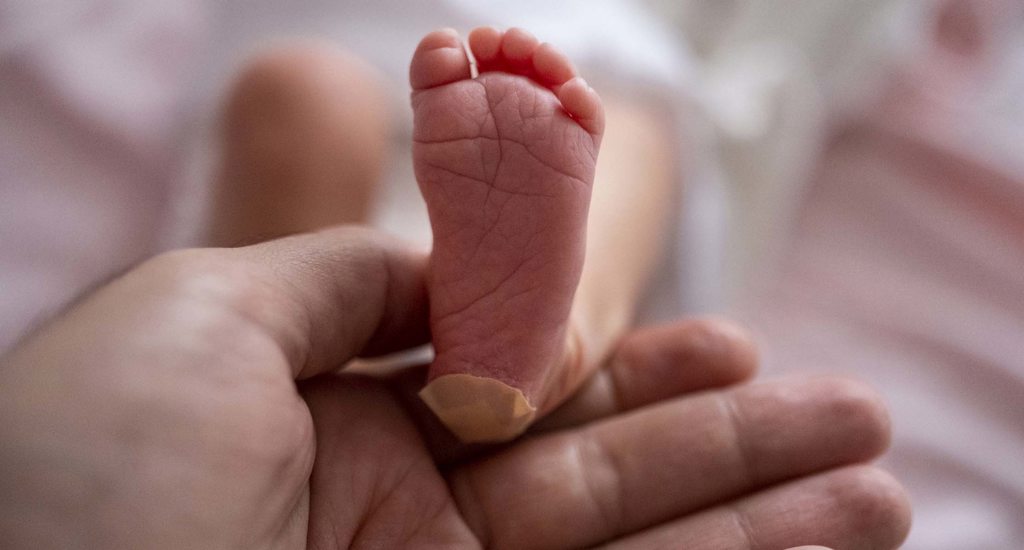What Newborn Screenings are Required in Pennsylvania?

Newborn screenings are a vital tool in detecting health conditions present at birth, when they may be easier to treat. According to the CDC, nearly 12,500 newborns each year are diagnosed with one of the conditions detected through screening. That means approximately 1 out of every 300 newborns is diagnosed early thanks to these important tests.
What is newborn screening?
“Babies can be born with various health conditions without displaying any symptoms or signs of the problem at first,” said Mohamed Hassan, MD, who is board certified in Neonatal-Perinatal Medicine and General Pediatrics and sees patients at Penn Highlands DuBois. “Newborn screenings check for these conditions because when they are identified early, it is often easier to treat or prevent more serious health issues.”
When is newborn screening done?
Newborns are screened after birth and before leaving the hospital, generally when they are one or two days old. If your baby is born at home or in a non-hospital setting, talk to your healthcare provider about scheduling a newborn screening in the same timeframe. While screenings are performed shortly after birth, it may take several days before receiving the results.
What are screenings comprised of?
There are generally three parts of newborn screening: blood tests, hearing and heart.
Blood tests: Blood tests check for rare but serious health conditions, such as cystic fibrosis, sickle cell disease and severe combined immunodeficiency. Your healthcare provider will prick your baby’s heel to get a few drops of blood which are sent to a lab for testing.
Hearing screening: This tests for hearing issues. Your provider will place tiny earphones in your baby’s ears. They will then use special computers to see how your baby responds to sound.
Heart screening: This screening checks your baby for a group of heart conditions called critical congenital heart defects (also known as critical CHDs or CCHDs). It uses a simple test called pulse oximetry, which uses sensors placed on your baby’s skin to measure the amount of oxygen in your baby’s blood.
What conditions are screened for in Pennsylvania?
Pennsylvania state law mandates newborn screenings for the following as well as others:
- Amino acid disorders
- Endocrine disorders
- Fatty acid oxidation disorders
- Hemoglobin disorders
- Lysosomal storage disorders
- Organic acid conditions
- Critical Congenital Heart Disease
- Cystic Fibrosis
- Hearing issues
- Severe combined immunodeficiency
- Spinal muscular atrophy
- T-cell related lymphocyte deficiencies
What happens if the screenings detect something?
The vast majority of newborn screening results are normal. If one of the screenings is not, it may simply mean that your baby needs more testing. Your provider will likely recommend a diagnostic test to see if there is a real health issue. In some cases, the diagnostic test comes back as normal and no further testing is needed. If the diagnostic test detects something, your healthcare provider will recommend the next steps for you and your baby.
If one child has a health condition detected by a screening, will a sibling also have it?
“Many of the health conditions detected by screenings are inherited,” said Dr. Hassan. “If you have a child with a health condition, your provider can talk about the types of genes, birth defects and other medical conditions that run in families and that can affect a future baby’s health.”
The Maternal and Child Center at Penn Highlands Healthcare provides quality care for expectant and new mothers and their babies in Northwestern and Central Pennsylvania. With a Maternity Unit and Neonatal Intensive Care Unit at Penn Highlands DuBois, women in the region can rest assured that their newborns will have the necessary tests and healthiest start possible. In addition, the Penn Highlands Healthcare neonatology physicians and providers with Penn Highlands Pediatrics offer specialized newborn care to infants in the hospital and health and wellness as the child grows. To learn more, visit www.phhealthcare.org/baby.
